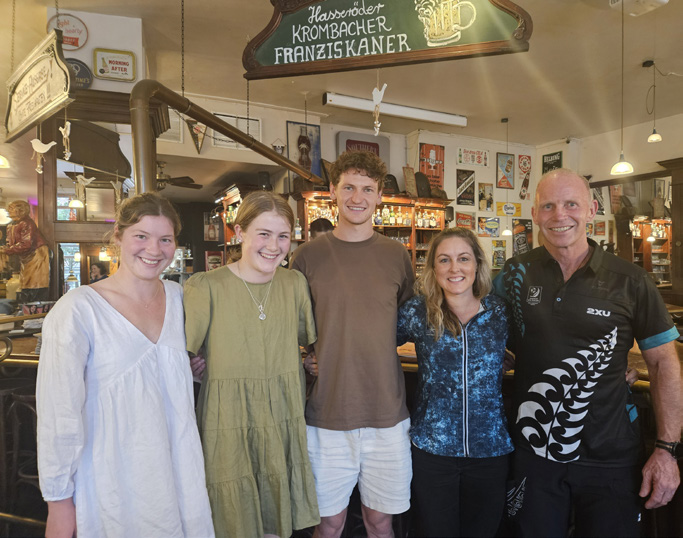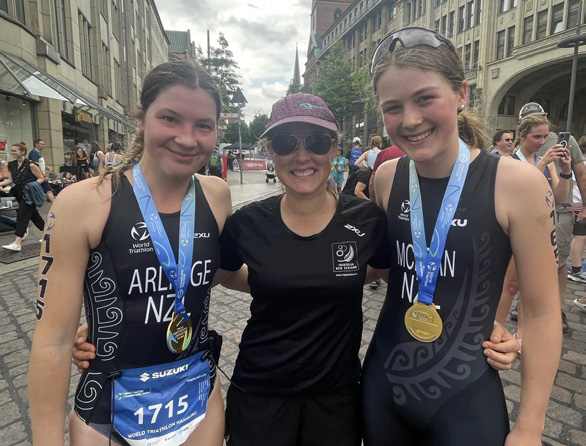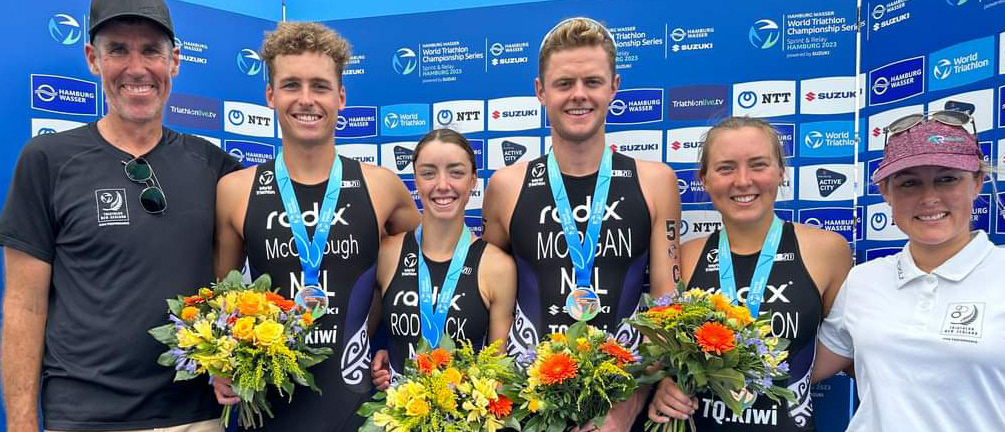Tammy Reed
Tammy Reed
- Coach Profile
Triathlon coach/Triathlon NZ Women and Girls Lead
From helping struggling athletes to rebuilding her own life, resilience is a word that resonates strongly with triathlon coach Tammy (Tamara) Reed, who has emerged from tragic circumstances to re-find her happy spot in coaching.
The highly respected coach, who trains individual athletes while also working part-time as the Women and Girls Lead with Triathlon New Zealand, has an impressive resume, but a devastating personal loss 18 months ago left her career hanging in the balance.
After establishing a thriving triathlon coaching scene in Manawatu through their F3 training programme in 2014 and subsequent Manawatu Triathlon Academy (MTA), Reed and her husband, former triathlon Olympian Shane Reed, had instant success in attracting new young talent to the sport while providing top-line coaching.
The tragic death of Shane in October 2022 after being diagnosed with brain cancer six months earlier, aged 49, heralded the end of the successful coaching businesses the pair had started together, but for Tammy, her in-built resilience helped with picking up the pieces and starting again.
Reed moved to Taranaki with her two sons from Manawatu just over a year ago to be closer to family. With Shane’s earlier encouragement, she has been slowly rebuilding her coaching career.
“It feels like I’ve had to start from scratch again, but it is what it is,” she said. “There was a period when Shane was very ill and when he passed away that it was very hard to continue with coaching because I was pretty much caring for him 24/7.”
“There were athletes that I continued to write programmes for during this time, but I couldn’t do the group coaching sessions anymore because I couldn’t leave the house when I was looking after Shane.”
“So when I moved to Taranaki, there was a group of athletes that stayed with me, and I continued to write their training programmes, and from there, I have just slowly built up training personal athletes again and have a group of 16 now.”

The daughter of an air force father, Reed moved frequently in her younger days but dabbled in many sports. At high school, individual codes appealed more, and Reed became fully immersed in athletics, including cross-country, cycling, mountain biking, and triathlon.
Attending Marlborough Girls College at the time, Reed competed in her first triathlon in Blenheim at the age of 16. Significantly, it was the first women’s triathlon in New Zealand and the longest-running one.
Taking part with her mother, the pair won the mother-daughter category, which began her focus on triathlon.

“Those doubts delayed me in starting, and when I reached 30, I thought, `Right, just do it and see what happens’. I’m the type of person if you don’t give it a shot; you don’t want to regret anything in life, so just give it a go and if it doesn’t work out, at least you’ve tried.”
In a transition phase, Reed continued with the Air Force for the next few years before merging into coaching full-time, which allowed her to build up a clientele base while maintaining an income.
Ex-professional New Zealand triathlete Jenny Rose provided the necessary mentoring during the early stages and has been with Reed throughout.
Reed created the F3 Triathlon Coaching programme at Manfeild. She focused on the training programmes while Shane ran the swim squads.
“I just started with local people who were age-group beginners from varying backgrounds who just wanted to get into the sport,” she said.
“That’s where it started, and the more I worked with Jen Rose, who was at the time, the Lower North Island Junior Development coach, the more I started to enjoy working with the development, so I started to merge into the junior side a little bit more.”
“She ended up giving that role over to me when I was about 33, and that’s when I built up a group in Palmerston North called the Manawatu Triathlon Academy, which worked alongside the tri club.”
The MTA was an academy for development athletes in Manawatu between the ages of 10 and 19.
“From what I saw in our sport, an individual sport, everyone was doing it by themselves. It just wasn’t fun, and we weren’t retaining kids in our sport, so that’s why I created these group sessions three times a week,” Reed said.
“It wasn’t so much about the physical side, it was more about the social side and increasing their skill set, having fun and connecting together.”
“We had about 50 kids in that programme at one stage, and half of them were females, which was the biggest group of females in triathlon in New Zealand. That was something I built from scratch and am really proud of.”
“And there’s still a lot of those athletes racing today. In fact, seven of them were racing at the Junior Oceania Championships (held in Napier in February), which is so good to see.”
Reed had also gained some formal qualifications during this time, which included a diploma in sport and exercise science, was a Triathlon New Zealand-accredited coach and was the first person in New Zealand to become an Arthur Lydiard-qualified coach.
“You never stop learning as a coach,” she said. “You’re like a jack-of-all-trades without specialising in one particular thing. It’s a never-ending learning process, so you’ve got to tap into nutrition courses, female physiology courses, coach development courses……you never stop and if you do, you don’t grow and stay stagnant.”

“I’m forever reading and forever finding courses to go to and now have a number of qualifications.”
“Everything keeps evolving. High-Performance Sport New Zealand (HPSNZ) have a core knowledge programme, which I tap into and which is really good for connecting coaches together through workshops.”
“It’s not just the learning part; you’re connecting with other coaches, which I really enjoy. A lot of the learning comes from speaking and connecting with other coaches and collaborating with other sports codes.”
Reed was part of the second intake of coaches selected for the HPSNZ Te Hāpaitanga programme for emerging and high-potential female coaches in 2022 and is now on a residency experience with HPSNZ.
“As a coach, it can be quite isolating working by yourself. In the past, I only had Shane to work with really, so it’s been great to open up that lens and have different ideas and perspectives on other sports. Everything is cross-transferrable,” she said.
“And just the support side of things. There are always ups and downs, and just being able to get the support to get through experiences you haven’t had to go through before is invaluable. We have case studies that we all talk through, and everything is just so enlightening.”
Many people have influenced the resilient Reed, and that quality motivates and inspires her as a coach.
“It happens quite a lot, moments when an athlete is struggling with something and you’ve just got to figure out what the problem is, and I love that problem-solving side, and then being able to help them through that journey.”
“And, despite going through a period of struggle, getting them to see that they can achieve the end result. That’s what I like the most about it.”
Taking up triathlon after losing her left arm above the elbow, Shaz Dagg became New Zealand’s first para-triathlete, going on to win silver medals at the Para-triathlon World Cup and Oceania Championships and holds a special place in Reed’s list of career highlights.
“Coaching Shaz was a massive career highlight because I coached her before she lost her arm, coached her as an able-bodied athlete, then again after she had her accident and lost her arm,” Reed said.
“That was a really rewarding experience because I had to coach so differently and learn something completely different with the same person. She broke the barrier for para-triathlon in New Zealand, and now we have a group of para-triathletes racing, so that was a special moment.”
“Another career highlight happened just recently at Napier for the World Oceania Championships when Hayley Cornwell, an under-19 junior (from the MTA), won the bronze medal.”
“And Sam Parry, when he was an under-19 athlete, he was No 1-ranked going into the Under-19 World Champs. Unfortunately, he got Covid that week and couldn’t race, but that was another career highlight, getting an under-19 athlete to the top of the rankings for the sport ahead of world champs.”
After some extremely tough and challenging times, it would not have been out of the question for Reed to relinquish her coaching career, but with strong support and encouragement, the aspirations have remained intact.
“I was encouraged to stay when I could easily have let it go through last year. I had a lot of support, and without that support, I definitely would have let go,” she said.
“So, no, I’m not going to stop coaching. I really enjoy working, particularly with young people, and there have been young people over the last 10 years that I’ve worked with who still keep in touch and come and visit me.”
“And that just makes me really happy that you’ve made a positive impact in their life, and they still want to stay in contact.”
“The most important thing to me is that people are enjoying it because sport should be for life, so if I see someone not enjoying it, I really try and find out why.”